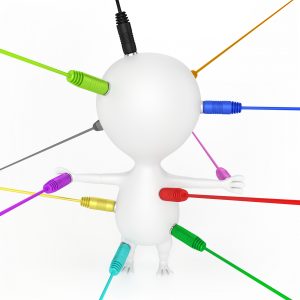
“Unplugging” Can Make You More Valuable To Your Company, Not Less
Work-life balance is a topic I address fairly often. Most of us inherently accept the need for that balance, since we just naturally understand that spending time with family and friends is important. But lately, I’ve read some interesting articles on the subject, and it turns out that it’s not just a “feel good” issue.
There are very tangible and real reasons that dictate the necessity of unplugging from our workplaces periodically, no matter how difficult that has become in this connected age.
A Measurable Effect On Our Attitudes
Thanks to the Internet, smartphones and other technologies, the office walls don’t represent any kind of boundaries any longer. We may well go home, but many of us never really leave our jobs behind. This has a huge impact on the way we think and feel about those jobs – an important gauge of our attitude as we face each day.
Research conducted by CareerBuilder revealed that 24% of workers feel like their jobs are “24/7” because they are so connected to the office. And of those workers who feel that way:
• Nearly 50% feel stress because of this, feeling that they have no downtime
• 44% feel like they don’t have much work-life balance
• 20% say this has caused a strain on their relationship with their spouse or partner
• 17% say they can’t enjoy leisure activities because work distracts them
Those last two, in particular, are obvious red flags and go beyond simple happiness or job satisfaction. In another survey, more than 25% of workers who have a paid-time-off program still feel guilty taking a day off and feel they have to make an excuse for doing so.
This seems to support other past research results that show today’s workers fail to take all the vacation to which they are entitled, simply because they fear that doing so will somehow displease a boss or indicate a lack of commitment. This is unhealthy for the individual and can clearly cause morale and productivity problems for the organization.
The Science of Shutting Down
I came across other articles that speak to the physical realities of brain function. Like any other part of the body, the brain needs a break. The constant need to be “on” and ready to engage with office matters gets in the way of those restorative breaks, and the never-ending flurry of messages from email and social media forms an obstacle course for the brain to negotiate on its path to relaxation.
Research into the over-stimulated brain of today is still preliminary; after all, the number of electronic and social media messages flashing in front of it today is increasing so rapidly it’s difficult for researchers to keep up. But what is known is that without proper rest periods, the brain loses its ability to distinguish the important things from those that are not.
This constant need to react to one new stimulus after another contributes to what has been called “popcorn brain.” In this condition, the cute cat picture or the notification of a “like” on a previous Facebook post is given the same attention as an urgent call from the boss, a baby’s cry or a doorbell. Brain burnout is sure to follow.
Psychologists have equated this inability to focus, this constant shifting of attention from one thing to another, to the challenges people with ADHD face – except we are bringing it upon ourselves. We lose not only the important matters that may be overlooked in the shuffle, but our very abilities to engage in deep thought, make critical distinctions, or generate creativity. That’s not a good thing. But what can we do?
Schedule Breaks For Your Brain
To get the best from your brain, you need to give it a rest, but that recovery time is anything but wasted. Quiet time maximizes brain function. Other studies have shown that things like a short walk, listening to music or even daydreaming help the brain recharge; in fact, those activities done immediately after a lecture, meeting or other new experience will actually help you better remember material discussed at those events.
But note: that’s only the case if it is truly a rest period, and not filled with social media scans, email checks or other forms of message-mania that defeat the purpose.These “brain breaks” work best when they are scheduled and taken regularly, as part of your normal routine and not subject to skipping just because you are busy. Remember, these breaks help productivity, not hurt it.
Remember during those “brain break” periods to unplug completely with no media or phone at your side. Turn them off and leave them in another room if you have to. And make your vacations “digital detox” opportunities, as well. Your family will certainly appreciate it and so will your boss when he or she gets the benefit of a refreshed, full-service brain at their disposal when you get back.
More Tips to Unplug and Improve Work-Life Balance
In an upcoming post, I’ll share some additional tips on how to “unplug” from work and improve your work-life balance. But as they say in the old westerns, “time’s a wastin’” and so are your brain cells so don’t wait to take time to unplug. Remember, the answer isn’t as simple as working less; it’s really about working smarter so both you, and your company, benefit in the long run.


